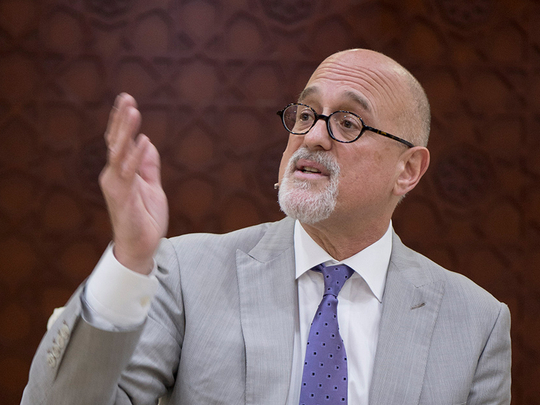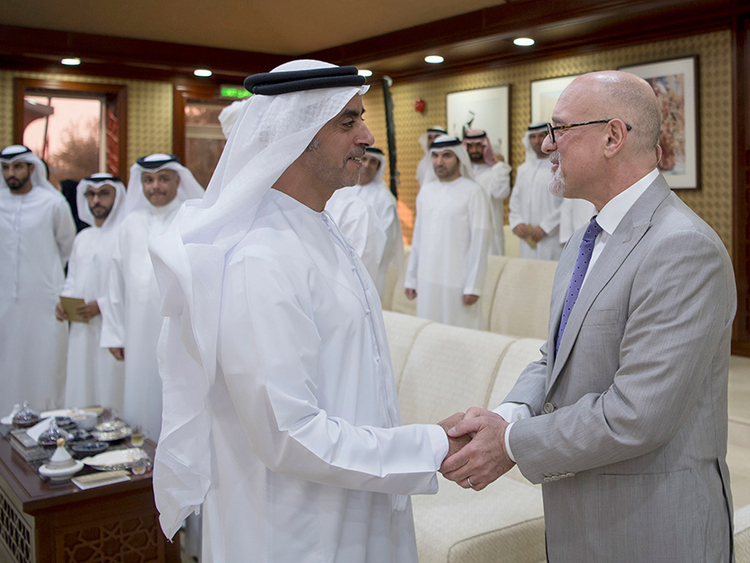
Abu Dhabi: UAE has made happiness the most centred piece of its policy and no other nation has been this wise, Harvard happiness guru Dan Gilbert said on Wednesday.
Gilbert, Harvard professor of psychology and best-selling author of Stumbling on Happiness, on Wednesday presented an array of scientific research from economics, psychology, and neuroscience to assess a recipe for happiness.
“Happiness is the ultimate goal of all social policies, and yet those policies are rarely informed by scientific facts and are instead based on people’s intuitive beliefs about what does and does not bring happiness. For example, people all over the world believe that marriage, money and children promote happiness — but do they?” professor Gilbert asked.
Professor Gilbert told a packed house at the majlis of His Highness Shaikh Mohammad Bin Zayed Al Nahyan, Crown Prince of Abu Dhabi and Deputy Supreme Commander of the UAE Armed Forces, that in the last two decades, psychologists, behaviour economists, and cognitive neuroscientists have applied all the standard tools of science to questions about human happiness, and they have discovered that some of our beliefs about it are quite wrong.
On why the UAE focuses on happiness and has a minister for happiness, His Highness Shaikh Mohammad Bin Rashid Al Maktoum, Vice-President and Prime Minister of the UAE and Ruler of Dubai, has said that focusing on happiness is both feasible and fully justified. “Happiness can be measured, and its evaluation is already the subject of many programmes and studies. Moreover, it can be developed and its achievement linked to material objectives. Studies have shown that happy people produce more, live longer, and drive better economic development in their communities and countries,” said Shaikh Mohammad on his Twitter account.
“The happiness of individuals, families, and employees, their satisfaction with their lives and optimism for the future are crucial to our work, which cuts across every sector of government. That is why there must be a minister to guide and follow up with all government institutions [as well as provide leadership to the private sector],” Shaikh Mohammad said.
Gilbert asked the audience members how many believed getting married led to happiness.
“Married people are happier than unmarried people. They are healthier, live longer,” and do better on nearly every indicator of happiness, Gilbert noted during his lecture titled ‘Why We Need A Science of Happiness’.
Gilbert pointed out that the quality of a marriage is, unsurprisingly, closely connected to one’s level of happiness. On average, marriage “makes you happier for 15 years, making it a worthwhile investment, but happiness levels may diminish over time,” Gilbert said. Of course, “staying in a bad marriage” makes people unhappy, he said, but people in bad marriages “get much happier after divorce”.
Gilbert then turned to money, describing how people typically deny a connection between money and happiness.
The interplay of money and happiness is subject to diminishing marginal returns, noted Gilbert, who showed a graph revealing a correlation between the two increases at lower income levels and lower returns at higher levels. What’s the sweet spot where each dollar buys the most happiness? Gilbert said a per capita income of $65,000 (Dh238,728) achieves 95 per cent of one’s happiness.
He then suggested that people with higher incomes aren’t spending their money on the right things. Time spent resting, for example, the dream of so many working people, simply doesn’t deliver happiness. “People are happiest when the mind is engaged,” Gilbert said. People are [also] happier when they give money away rather than spending it on themselves.
Gilbert then discussed children, his mum’s last ingredient for happiness. While people might refer to them as “bundles of joy”, said Gilbert, “they’re not a source of happiness”. He displayed a bar graph showing that childless adults are much happier than parents. “Once people have kids, there’s a downturn in happiness,” he said, which is not reversed until the kids move out. “The only symptom of empty nest syndrome,” Gilbert said, chuckling, “is non-stop smiling.”









